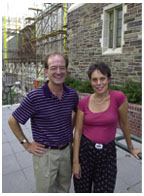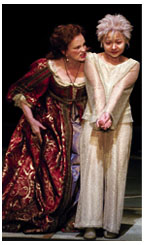March 26, 2003: Features

 A
creature of the Theater
A
creature of the Theater
The many roles of McCarter’s
Emily Mann
By Katherine Hobson ’94
On this late January day, the air outside McCarter Theatre is frigid and still. But inside, there’s a storm brewing. The cast of The Tempest is running through the play’s opening shipwreck scene, but there is no fiberglass boat, and no blue streamers standing in for water. Those props are not part of the vision of Emily Mann, director of The Tempest and artistic director at McCarter for more than 12 years. Instead, Mann is piecing together a new interpretation of the scene – cutting some of Shakespeare’s lines and characters, playing with the language a bit, and staging the scene in a way that points to an internal, more abstract storm, rather than a literal one.
Dressed in black pants and a plaid sweater layered over a succession of cotton shirts, she watches the actors carefully. She leads the 15-odd actors through a handful of run-throughs, layering on new components – taped sound effects, staging – until the actors are ready to try it with the full, booming voices they will need to reach the last row of McCarter’s 1,100-seat theater. “That’s the idea, you guys!” says Mann. The scene isn’t yet in its final form, but in 45 minutes she has taken a collection of sights, sounds, and actions and turned them into a living, wholly new idea.
Restaging the opening scene isn’t the biggest change Mann has made to The Tempest. In Mann’s version, Prospero has crossed the gender line; Tony Award-winner Blair Brown plays Prospera. (King Alonso has become a queen.) The actress and director worked for a year on the adaptation, giving a new slant to the play Mann says is ultimately about forgiveness. “One can choose it over vengeance,” she says. It’s a good theme for this particular moment in history, she says, and if that sounds like a political statement, well, it is. The 50-year-old Mann is a playwright as well as a director and theater administrator, and her work is affecting and engaging, but also deeply concerned with larger historical themes: justice, fairness, and how human beings can be denied both but triumph nonetheless. At McCarter she directs her own plays – including a Tony-nominated adaptation of the book Having Our Say, about the famous centenarian Delany sisters – and a varied mix of classics and new plays: Fool for Love, The Cherry Orchard, and Joyce Carol Oates’s The Perfectionist.
|
Mann, in 1999, with Michael Cadden, left, director of Princeton’s Program in Theater and Dance, and Roger S. Berlind ’52, whose gift is allowing McCarter Theatre to add a smaller, more intimate performance space. (Frank Wojciechowski)
McCarter Managing Director Jeffrey Woodward with Mann outside what will be the Berlind Theater. (Frank Wojciechowski)
Joan Marcus, Blair Brown, left, as Prospera and Julyana Soelistyo as Ariel in Mann’s staging of The Tempest. (frank wojciechowski) |
Since Mann’s arrival in the summer of 1990, McCarter has seen subscriptions rise from 6,900 to more than 12,000, and has won awards including the 1994 Tony for Outstanding Regional Theater. The theater also has deepened its relationship with Princeton University, just across University Place, to the benefit of both institutions. With the opening of the 350-seat Roger S. Berlind Theater, a major expansion of McCarter due for completion by the time the 2003—04 season opens in September, those ties will only get stronger. The Berlind is financed jointly by McCarter, Princeton, and individual donors, including Roger S. Berlind ’52, who contributed $3.5 million. Its performance schedule will be split between Princeton and McCarter productions, with professional actors and senior-thesis cast members using the same stage.
It’s hard to exaggerate how visibly thrilled Mann is about the addition of the new, smaller performance space and its accompanying rehearsal rooms. “We are champing at the bit,” she says. “The main stage is bigger than any space on Broadway. We’ve learned to conquer that, but it takes a lot out of you. I needed to have space where I could do intimate work.” One of the rehearsal areas will become what Mann calls a “theater in the room,” a laboratory for more experimental works or collaborations between actors, choreographers, musicians, and other performers. “I have a list of about 20 things I want to do there,” she says. Among them: an opportunity for Princeton students to interact directly with the parade of theater stars that comes through McCarter each season. “It’s as if undergraduates were allowed into the major scientific labs,” she says.
The campus connection
Campuses are comfortable places for Mann. She grew up as a faculty child; her father, the late Arthur Mann, was a historian at the University of Chicago, M.I.T., and Smith College. Arthur Mann also helped inspire his daughter’s love of theater, taking her to one of the first plays she ever saw, the musical Fiorello! (He had written a biography of the New York City mayor.)
As a child in Northampton, Massachusetts, Emily Mann loved creative writing, music, dance, and art. Theater became a way to bring all of those things together in one art form. That career choice, however, didn’t mean turning her back on academics. She attended Harvard, graduating in 1974 with a degree in literature. While she studied playwriting there, she says the nontheater courses she took only broadened her outlook, giving her access to more material than a straight theater background would have. Determined by then to focus on the stage, Mann went on to get an M.F.A. at the University of Minnesota in 1976. She started directing, moving up to big names like the Guthrie Theater in Minneapolis, the Brooklyn Academy of Music, and the Mark Taper Forum in Los Angeles, but never ran a theater until McCarter called in 1989.
Because of her background, the move to McCarter, while on the face of it a risk for both Mann and the theater, was a natural progression. “She simply gets what universities do,” says Michael Cadden, director of Princeton’s Program in Theater and Dance. “So some of the suspicion that one hears exists between professional theaters and academic institutions is simply not there.” The two didn’t know each other before Mann was appointed, but they quickly bonded over lunch and shared dramatic tastes. “Our three favorite playwrights are Shakespeare, Ibsen, and Chekhov,” he says. “Most people would say Shakespeare and Chekhov, but not everyone would say Ibsen. We share something unusual.”
Mann and Cadden also shared a vision about how the purposes of McCarter and the university might converge. “We were very interested in figuring out how to break students of the habit of feeling that McCarter is someplace to visit once a year for the Triangle show,” says Cadden. Mann introduced a student ticket policy, making it more convenient and affordable for students on a budget to take advantage of McCarter’s 200-plus nights of programming per year – not only plays, but concerts and dance performances. She teaches classes in directing with Cadden and helps bring directors and playwrights, including Athol Fugard and Edward Albee, to teach and lecture on campus. For her work at both McCarter and the university, Mann was awarded an honorary doctorate of fine arts at last June’s commencement.
She also has taught her own course in documentary theater. That’s the term, along with “theater of testimony,” used to describe the kind of play for which she’s most famous. Like the actress and playwright Anna Deavere Smith (whom Mann directed in Twilight: Los Angeles 1992, a one-woman show about the Los Angeles riots), Mann creates entire plays using actual dialogue from real people, culled from texts and interviews. Her first foray into the genre came after she paged through interviews her father had done for an oral history project about the Holocaust. Intrigued by one woman’s story, she thought it might be a good basis for her first play; her father said it was a great idea, then essentially told her to go out into the world to find her own inspirational characters. Mann traveled to Poland and discovered that character in a friend’s aunt, a Holocaust survivor named Anulla. The resulting play, Anulla: An Autobiography, premiered at the Guthrie Theater in 1977.
Mann went on to write Execution of Justice, about the trial of San Francisco Supervisor Dan White, who used the famous “Twinkie defense” to explain why he killed fellow Supervisor Harvey Milk and Mayor George Moscone in 1978. Still Life dealt with the aftermath of Vietnam, told through a conversation between a veteran, his wife, and his friend. And Greensboro: A Requiem, which premiered at McCarter in 1996, addresses the murder of five anti-Ku Klux Klan demonstrators at a 1979 march. Mann also has written more traditionally structured plays, including an adaptation of Isaac Bashevis Singer’s book Meshugah.
Ideas bombard her all the time, and she can’t possibly follow up on all of them. “Someone comes to me with a story, and I will find every reason not to do it,” she says. A handful are so compelling she can’t avoid pursuing them; some theme or character grabs her and won’t let go. She’s got to love the subject, because for her documentary theater works she conducts hours of interviews with the subjects, as she did for her adaptation of Having Our Say. From the Delany sisters to unapologetic Klan members, people feel comfortable with her, and find her open and nonjudgmental. “I’m the kind of person whom people sit next to on the train, and by the end of the trip I know their life stories,” she says.
Experiments encouraged
But there is clearly more to it than a sympathetic smile and an empty seat next to her. Annabel Soutar ’94 took Mann’s documentary theater seminar in her final semester at Princeton. “She taught us how important it is to have this very strong curiosity,” says Soutar, now president and coartistic director of Projet Porte-Parole, a Montreal-based documentary theater company she founded. “And she told us that the most important thing is to listen and say as little as possible. You cannot prejudge the people you’re interviewing. You have to let the person surprise you, and you have to treat them with respect. If you abuse that, you lose their trust.” While most students at Princeton don’t go on to professional theater careers, Mann says they are no less rewarding to teach. “I’ve found them so bright,” she says. “They’re not looking at things narrowly; they’re thinking deep thoughts, and that’s exciting.”
Soutar and Mann also both recall an impromptu consciousness-raising session during that theater class. Mann, often one of the first women to direct a play at the theaters in which she has worked, discovered that some of the Princeton women in her seminar abhorred the word “feminism” and couldn’t understand why the concept was even necessary. “The younger generation doesn’t see it,” says Mann. She reminded them that it wasn’t so long ago that women weren’t allowed to attend Princeton. “They didn’t know that they couldn’t do whatever they wanted. That’s great, but it’s good to have a sense of history, and to know what they should be thankful for.” Mann says the American theater world has changed, with the rise of female directors and playwrights like Anna Deavere Smith and Julie Taymor, the first woman to win a Tony Award for directing a musical (for The Lion King). At the top, though, it’s still an overwhelmingly male community. “The door is unlocked, but it’s still not open,” Mann says.
Mann’s latest collaborator, Tony-winning actress Blair Brown, shares the belief that theater can be a force for social change as well as for entertainment. “It’s been fascinating to work with someone who is roughly a peer, about the same age,” Brown says. “We’re both very politically involved, we’re both committed to the theater. We have a communication that’s both instant and full.” They met at the Guthrie in the mid-1970s, and have been friends ever since, but somehow had never worked together. After Brown appeared in McCarter’s 2001 production of Athol Fugard’s Sorrows and Rejoicings, they got to talking and tossed around the idea of plumbing Shakespeare for a play that could be made new by recasting a lead male role as female. Brown initially suggested King Lear (to be converted to Queen Lear), but they decided the theme of that play was really about fathers and daughters and settled instead on The Tempest.
“Prospera is much richer than many classic female characters are,” says Brown. Even in Shakespeare, she says, female characters are often reactive, filling in the story lines between the male protagonists. “Their roles are about love – they’re the object of love, they love someone else who doesn’t love them, they get too much love from the wrong person. But this is a character concerned about mortality – not about aging and whether she can stay beautiful. It’s about love, but also power and forgiveness. It’s much broader.”
There could have been an awkward transition from friendship to professional collaboration. There wasn’t. “It’s been seamless,” says Brown. “Emily is a remarkable director in that she’s egoless. She’s open to what everyone brings, and has a way of talking to each of us in our own language. Yet she’s also fully in control and can take over if need be. That is very, very rare.” Brown also mentions something that comes up over and over in discussions of Mann’s style as both a director and teacher: She lets you into the process, lets you see her experiment until she finds the right way of doing something, lets you know that it’s OK for actors and students to experiment as well. In the early days of rehearsal, it’s impossible to do anything that can be labeled a mistake. “She inspires us to be free and dangerous,” says Brown.
Mann’s own writing has lately taken a back seat to adapting and directing. After The Tempest finished its run in early March, she immediately jumped into her production of Uncle Vanya, by Chekhov, which will run from April 29 through May 18. (Running between the two Mann-directed plays is the world premiere of Fiction, written by Steven Dietz and directed by David Warren, from March 25 through April 13.) For Vanya, Mann has been working with Ellen Chances *72, a professor in the Department of Slavic Languages and Literatures, to translate the original Russian into “absolutely clear American stage speech” that retains Chekhov’s “simple stage poetry.” Also in the spring, a production of Meshugah plays at the Kirk Theatre in New York’s Theater Row Theaters complex. Mann has written screenplays; she adapted Having Our Say for a CBS-TV movie that won a Peabody Award, and says she’d do it again if the right situation presents itself. She is feeling a need to work on her own writing projects again, though she doesn’t like to give out details about her work in its earliest stages. Finding the time, though, is difficult. She remembers her friend and Harvard classmate, playwright Christopher Durang, telling her: “You think that once the play starts you’ll have all day just to write, but it never happens — there’s so much to do. You need to have the mind space to write.”
Balancing her multiple roles at McCarter means a packed schedule. It’s physically exhausting work, too. Rehearsals for The Tempest usually were held six days a week, and ran six hours straight, with only short breaks. Unlike her actors, Mann never has a scene in which she is not needed and can relax in a corner. She watches out for fatigue, a symptom of the multiple sclerosis with which she was diagnosed in 1994. (Doctors at first didn’t believe she had a physical illness, telling her it was all in her mind.) She controls the disease with the help of medications and a positive attitude. “I’m doing great,” she says. “I’m able to do everything. And I have a great family.” Her husband, Gary Mailman, practices law in Princeton, and her son, Nicholas, attends Northwestern University.
Somehow, Mann’s official titles and multiple other roles –
teacher, fundraiser, collaborator – do not pull her in different
directions. “It’s like a lot of tributaries flowing into one
big river,” she says. “I no longer make these strong separations
between being a writer, a director, and an artistic director. I’m
always trying to look at the big picture. I’m a theater creature,
whatever role I’m playing.” ![]()
Katherine Hobson ’94 is a writer at U.S. News & World Report.



